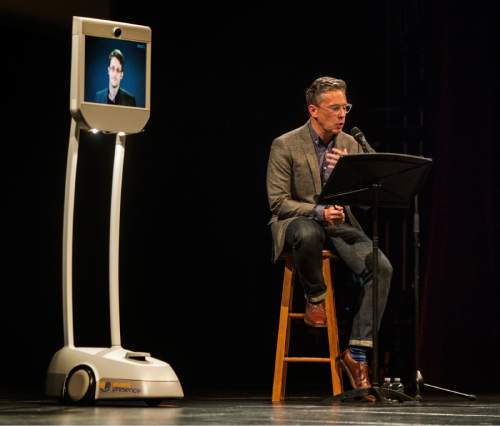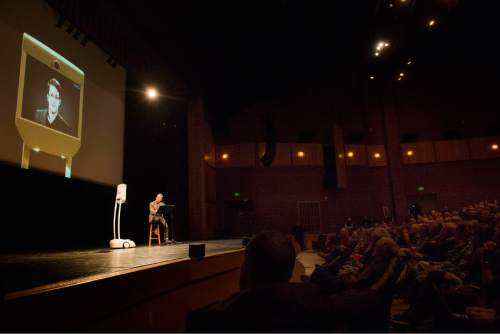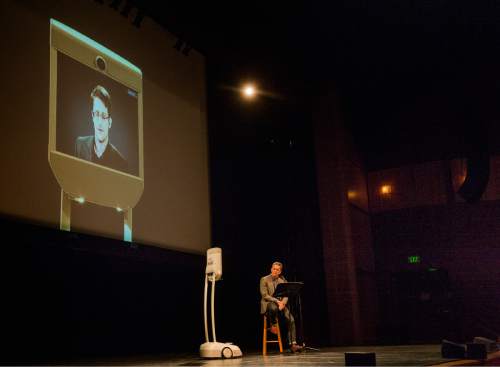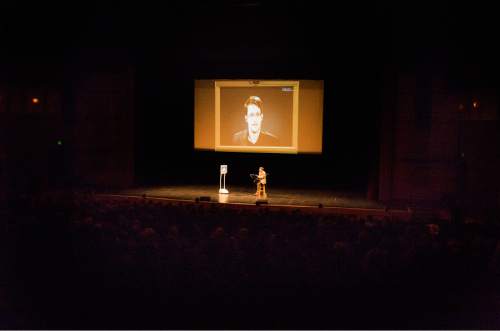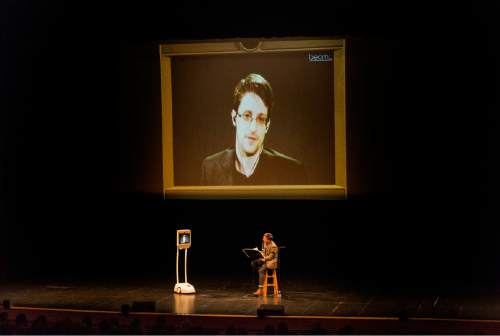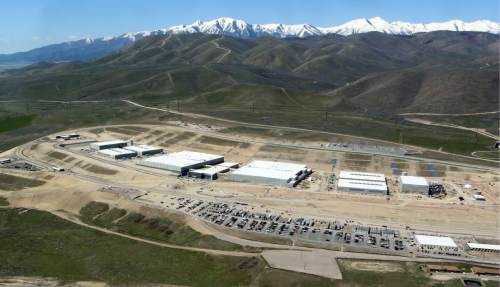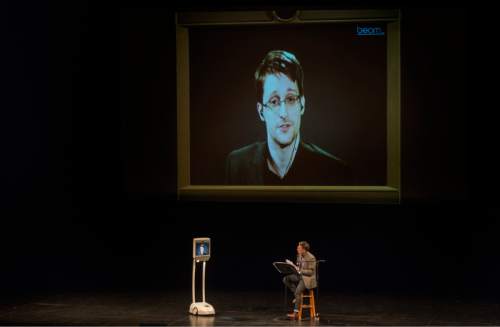This is an archived article that was published on sltrib.com in 2015, and information in the article may be outdated. It is provided only for personal research purposes and may not be reprinted.
Park City • Edward Snowden, the former intelligence contractor who leaked classified documents, told an audience here Saturday that a massive government data center in Bluffdale had earlier names and implied he has documents about surveillance at the Salt Lake City Olympics.
"It's good to be back in the United States," Snowden said, after a remote controlled, motorized monitor showing his face rolled onto the Eccles Center stage. "And I didn't even get a pardon."
The National Security Agency's Utah Data Center and the 2002 Olympics came up about 45 minutes into Snowden's digital appearance. KUER's Doug Fabrizio asked Snowden if it was correct the Utah Data Center was "the last straw" spurring Snowden to leak the documents.
No, Snowden said. He was worried about the scope of NSA surveillance, though the data center was a component of that surveillance.
"It did concern me what was happening in Utah," Snowden said, "particularly because of the name of the facility."
Snowden said the NSA and its contractors were referring to the facility as the "MDR," which stood for "Massive Data Repository."
The data center was later referred to internally as the "Mission Data Repository," he said.
The NSA has never referred to the Utah Data Center by those other names in public.
Fabrizio asked about a 2013 Wall Street Journal report that the government used Qwest Communications to monitor text messages and phone calls in Salt Lake City leading up to and during the 2002 Winter Olympics.
Snowden started his answer by saying he doesn't like to read and discuss documents that haven't already been made public.
"Everywhere the Olympics goes, the largest and most intrusive surveillance capabilities go," Snowden then said.
The Olympics have long been a big target for terrorists, he said.
"At the same time, does this mean we should have a constitution-free zone in a city in the United States for as long as the Olympics are there?" Snowden said. "I don't think that's so."
Snowden disclosed perhaps hundreds of thousands of documents to journalist Glenn Greenwald as well as journalists for The Washington Post and New York Times. Snowden left it to the journalists to decide what should be published based on the public interest and required them, he said, to give the government a chance to argue for secrecy.
So how did Snowden go from growing up in what he called a "federal family" — both his parents worked for the government — to being a whistleblower, Fabrizio asked?
Snowden described wanting to serve his country. He enlisted in the Army in 2004 but was discharged after breaking both legs in a training accident. Next, he joined the CIA.
Snowden later went to work for contractor Booz Allen. He gained access to documents discussing the NSA mass surveillance program "Stellar Wind." It had a classification "above top secret," Snowden said. The documents described warrantless wiretaps and other constitutional violations that had never been disclosed.
Critics have claimed Snowden damaged national security by disclosing U.S. spying secrets, though no one in federal government has offered a specific example of a counter-terrorism operation or defense program that has been jeopardized. In October, Utah Congressman Chris Stewart told a University of Utah audience Snowden is "one of the most destructive traitors" in American history.
The U.S. Department of Justice has charged him with two counts of violating the Espionage Act and theft of government property.
Snowden rejected the notion the recent attacks in Paris and San Bernardino, Calif., could have been thwarted if the attackers knew less about how government monitors them. Snowden pointed to government reports showing the NSA has not been able to stop any terrorist attacks and said mass collection of information is most useful for economic espionage, social control and diplomatic strategy.
"Paris, San Bernardino, this is the strongest evidence we have ever had that mass surveillance does not work," Snowden said.
Snowden said he would be willing to return to the United States for trial if the government agrees to not limit his testimony or the evidence he can present in court.
"Tonight, though the FBI probably isn't very excited about it, I'm not in Russia, I'm not on the Internet, I'm in Utah," he said.
John Hauer, of Moab, traveled to Park City to hear Snowden. After the discussion, he wondered whether, if surveillance did stop terrorism, if the government could acknowledge it without exposing its techniques. Hauer, 80, said he doesn't know where he stands on surveillance.
"I have a lot of questions I want answers to from other than the government or Snowden before I decide," Hauer said.
Twitter: @natecarlisle


